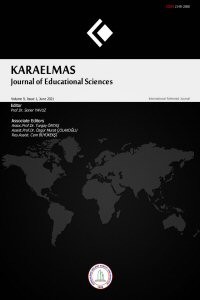Otantik Öğrenme Etkinliklerinin Öğrencilerin Fen Bilimleri ve Astronomiye Yönelik Tutumları ile Çevre Bilincine Etkisinin İncelenmesi
Bu çalışmanın amacı, otantik öğrenme etkinliklerinin öğrencilerin fen bilimlerine ve astronomiye yönelik tutumları ile onların çevre bilinci kazanmaları üzerindeki etkisini ortaya çıkarmaktır. Çalışmada veriler karma desene uygun olacak şekilde toplanmıştır. Çalışmanın katılımcılarının 24 orta öğretim öğrencisi oluşturmaktadır. Çalışmanın verileri “Çevre Bilinci Tutum Ölçeği”, “Fen Konularına Yönelik Tutum Ölçeği” ve “Astronomiye Yönelik Tutum Ölçeği” ve açık uçlu anket formu ile toplanmıştır. Çalışmanın sonunda otantik öğrenme etkinliklerinin öğrencilerin astronomiye yönelik tutumları üzerinde büyük etkiye, fen bilimlerine yönelik tutum ve çevre bilinçleri üzerinde orta düzeyde etkiye sahip olduğu sonucuna ulaşılmıştır
Anahtar Kelimeler:
Otantik Öğrenme, Yapılandırmacılık, Astronomi Öğretimi, Lise Öğrencileri
Investigation of the Effect of Authentic Learning Activities on Students' Attitudes towards Science and Astronomy and Environmental Awareness
The aim of this study is to reveal the effect of authentic learning activities on students' attitudes towards science and astronomy and their environmental awareness. The data of the study were collected with mixed methods research. The participants of the study were 24 high-school students. The data of the study were collected with the “Environmental Awareness Attitude Scale”, “Curiosity Scale for Science Subjects” and “Attitude Scale towards Astronomy” and interview form. At the end of the study, it was concluded that authentic learning activities had a large effect on students' attitudes towards astronomy, attitudes towards science, and a medium effect on environmental awareness
___
- Airasian, P. W. & Walsh, M. E. (1997). Cautions for classroom constructivists. The Education Digest, 62(8), 62-68.
- Ak, S. (2008). İlköğretim öğretmen adaylarının çevreye yönelik bilinçlerinin bazı demografik değişkenler açısından incelenmesi. Yayınlanmamış Yüksek Lisans Tezi. Abant İzzet Baysal Üniversitesi Sosyal Bilimler Enstitüsü, Bolu.
- Akay, C. (2013). Ortaokul öğrencilerinin yaparak-yaşayarak öğrenme temelli TÜBİTAK 4004 bilim okulu projesi sonrası bilim kavramına yönelik görüşleri. Mersin Üniversitesi Eğitim Fakültesi Dergisi, 9 (2), 326-338.
- Applefield, J. M., Huber, R., & Moallem, M. (2000). Constructivism in theory and practice: Toward a better understanding, The High School Journal, 84(2), 35-53.
- Avcı, E., Su Özenir, Ö., Kurt, M. & Atik, S. (2015). TÜBİTAK 4004 doğa eğitimi ve bilim okulları kapsamında ortaokul öğrencilerine yönelik gerçekleştirilen “Bizim Deniz Akdeniz” projesinin değerlendirilmesi. Amasya Üniversitesi Eğitim Fakültesi Dergisi, 4(2), 312-333.
- Brooks, J. G. (1990). Teachers and students: Constructivists forging new connections. Educational leadership, 47(5), 68-71.
- Callison, D. & Lamb, A. (2004). Key words in instruction: Authentic learning. School Library Media Activities Monthly, 21(4), 34-39.
- Creswel, J. W. (2013). Research designs: qualitative, quantitative and mixed method approaches. London: Sage Publications.
- Driscoll, M. P. (1994). Psychology of learning for instruction. Boston, MA: Allyn and Bacon.
- Eggen, P. D. & Kauchak, D. P. (2007). Educational psychology: Windows on classrooms. Prentice hall.
- Field, A. (2009). Discovering statistics using SPSS. Sage Publication.
- Green, S. B., Salkind, N. J., & Akey, T. M. (2000). Using SPSS for windows analyzing and understanding data. New Jersey: Practice Hall.
- Hendry, G. D., Frommer, M. & Walker, R. A. (1999). Constructivism and problem‐based learning. Journal of further and higher education, 23(3), 369-371.
- Iran-Nejad, A. (1995). Constructivism as substitute for memorization in learning: Meaning is created by learner. Education, 116, 16-31.
- Jadallah, E. (2000). Constructivist learning experiences for social studies education. The Social Studies, 91(5), 221- 225.
- Kauchak, D. E., & Eggen, P. D. (2003). Learning to teach: Research based methods.Pearson Education.
- Lombardi, M. M. (2007). Authentic learning for the 21st century: An overview. Educause learning initiative, 1, 1-12.
- Newmann, F. M., & Associates. (1996). Authentic achievement: Restructuring schools for intellectual quality. San Francisco, CA: Jossey-Bass Publishers.
- Olsen, D. G. (1999). Constructivist principles of learning and teaching methods. Education, 120(2), 347-355.
- Ormrod, J. E. (2000). Educational psychology: Developing learners. Upper Saddle River, NJ: Merrill.
- Özdemir, O. (2010). Doğa deneyimine dayalı çevre eğitiminin ilköğretim öğrencilerinin çevrelerine yönelik algı ve davranışlarına etkisi, Pamukkale Üniversitesi Eğitim Fakültesi Dergisi, 27, 125-138.
- Randall, J. (1997). Integrating high school chemistry with environmental studies and research. Journal of Chemical Education, 74, 1409-1411.
- Rule, A. C. (2006). The components of authentic learning. Journal of Authentic Learning, 3(1), 1-10.
- Slavin, R. (2000). Educational psychology: Theory and practice. Boston: Allyn and Bacon.
- Şimşek Laçin, C. & Nuhoğlu, H. (2009). Fen konularına yönelik geçerli ve güvenilir bir ilgi ölçeği geliştirme. Sakarya Üniversitesi Eğitim Fakültesi Dergisi, 18, 28-41.
- Topalsan Kınık, A., Türk, Z.. & Güler, G. (2019). Korunmaya Muhtaç Çocuklara Yönelik Gerçekleştirilen “Doğada Bilim Yapıyorum ” TÜBİTAK 4004 Projesinin Değerlendirilmesi. Journal of the Human and Social Science Researches, 8 (1, 581-607
- TÜBİTAK, (2020). 4004 Doğa Eğitimi ve Bilim Okulları. https://www.tubitak.gov.tr/tr/destekler/bilim-ve- toplum/ulusal-destek-programlari/icerik-4004-doga-egitimi-ve-bilim-okullari tarihinde ulaşılmıştır. adresinden 13.04.2020
- Vermette, D., Foote, D., Bird, C., Mesibov, D., Harris-Ewing, D. & Battaglia, D. (2001). Understanding constructivism (s): A primer for parents and school board members. Education, 122(1), 87-93.
- Vygotsky, L. S. (1978). Mind in society: The development of higher mental process. Cambridge, MA: Harvard University Press.
- Woolfolk, A. (2001). Educational psychology (8. Baskı). Boston, MA: Allyn & Bacon.
- ISSN: 2148-2888
- Yayın Aralığı: Yılda 2 Sayı
- Başlangıç: 2013
- Yayıncı: Zonguldak Bülent Ecevit Üniversitesi
Sayıdaki Diğer Makaleler
Özgür Murat ÇOLAKOĞLU, Cevat EKER, Birsen GÜNERI, Mümine AKÇAALAN
Betül DENİZ, Seyithan DEMİRDAĞ
Ortaokul Öğrencilerinin Akran Zorbalığı ve Dijital Oyun Bağımlılığı Arasındaki İlişki
Ortaöğretim Öğrencilerinin Nomofobi Düzeyleri Üzerine Bir Araştırma
Sınıf Öğretmeni Adaylarının Fen Bilimleri Dersi Kazanımları ile ilgili Farkındalıkları
Curriculum Learning OUTCOMES, Esra KIZILAY
Fatih ELEKOĞLU, Seyithan DEMİRDAĞ
Üniversite Öğrencilerinin Psikolojik Belirtilerinin İncelenmesi
Okan BİLGİN, Murat İNCE, Özgür Murat ÇOLAKOĞLU
